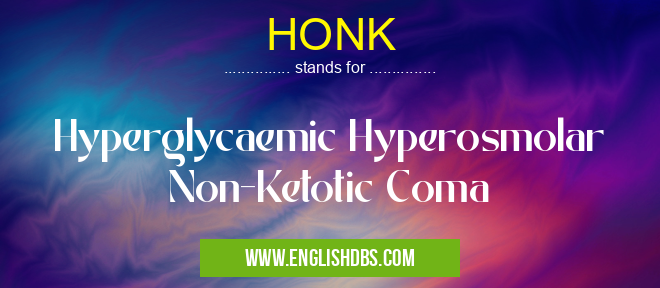What does HONK mean in DISEASES
Hyperglycaemic Hyperosmolar Non-Ketotic (HHNK) Coma is a potentially life-threatening complication of diabetes and is one of the most severe forms of hyperglycemia. It occurs when blood glucose levels rise to extremely high levels, typically above 600 mg/dL. The condition can result in long-term organ damage and even death if left untreated. HHNK coma is most common in people who suffer from type 2 diabetes and usually follows a period of extreme stress, such as an infection or surgery.

HONK meaning in Diseases in Medical
HONK mostly used in an acronym Diseases in Category Medical that means Hyperglycaemic Hyperosmolar Non-Ketotic Coma
Shorthand: HONK,
Full Form: Hyperglycaemic Hyperosmolar Non-Ketotic Coma
For more information of "Hyperglycaemic Hyperosmolar Non-Ketotic Coma", see the section below.
What is HHNK Coma
HHNK Coma is a very severe form of hyperglycemia that results in an elevated blood glucose level that is not accompanied by ketosis, which means that no ketones are being produced to offset the high glucose concentration. When this happens, the body has difficulty releasing stored glucose into the bloodstream, which leads to rapid dehydration and the development of organ failure due to lack of oxygen. This can cause severe brain damage, coma and even death if not treated quickly enough. The best way to avoid this scenario is for those with diabetes to closely monitor their blood sugar levels and take action if they start getting high.
Symptoms
The symptoms of HHNK coma vary depending on how long it has been present before treatment begins. However, some common signs include confusion or disorientation, extreme thirst or dehydration, dry skin or mouth lesions (due to dehydration), tiredness or drowsiness, increased heart rate, decreased urination frequency or output, nausea or vomiting, abdominal pain or discomfort and seizures due to hypoglycemia (low blood sugar). If these symptoms are noticed then immediate medical attention should be sought.
Treatment
Treatment for HHNK Coma involves addressing both the hyperglycemia itself as well as correcting any underlying issues that may have caused it in the first place. In terms of treating the hyperglycemia itself, it typically involves administering fluids intravenously in order to replace any lost electrolytes as well as insulin in order to lower blood glucose levels quickly while also providing sufficient nutrition so that organs are adequately nourished during recovery. Additionally it may involve glucagon injections as well as other medications depending on what caused the hyperglycemic episode initially. It's important for doctors to consider all possible causes so they can help prevent further episodes from occurring in the future.
Essential Questions and Answers on Hyperglycaemic Hyperosmolar Non-Ketotic Coma in "MEDICAL»DISEASES"
What is Hyperglycaemic Hyperosmolar Non-Ketotic Coma (HONK)?
HONK is a severe complication of diabetes. It is a life-threatening emergency caused by uncontrolled hyperglycemia, or extremely high blood sugar levels. During HONK, the body's cells become severely dehydrated due to osmotic imbalance, resulting in increased concentration of electrolytes in the blood. As a result, the patient can become comatose.
What are the most common causes of HONK?
The most common cause of HONK is untreated type 2 diabetes that has been poorly managed for an extended period of time. Other causes may include diabetic ketoacidosis, certain medications, infections and stroke.
What are the symptoms of HONK?
The most common symptom of HONK is an extreme level of dehydration due to hyperglycemia and electrolyte imbalances. This may result in feeling weak or lethargic, confusion or decline in mental status, and irregular breathing patterns. Patients may also experience numbness or tingling sensations in their extremities.
Who is at risk for developing HONK?
Those who have diabetes are at highest risk for developing HONK since it's primarily caused by an uncontrolled rise in blood sugar level from not managing one's diabetes correctly. Individuals who have had prior episodes of diabetic ketoacidosis or other serious metabolic complications due to diabetes are also at risk. People with certain medical illnesses and those taking certain medications may also be more predisposed to developing HONK than those without such conditions or taking such medications.
How is a diagnosis made if an individual experiences symptoms similar to HONC?
To diagnose individuals suspected to have experienced HONC episode, doctors need to perform a variety of laboratory tests including glucose levels; urinalysis; pH balance; electrolyte levels; calcium levels; BUN/creatinine ratio; liver function tests; thyroid hormone levels; arterial blood gases test; chest X-ray; MRI scan or CT scan as well as other tests depending on the underlying cause (if any).
What treatment options are available for those suffering from from HONC?
Treatment options depend on the severity and underlying cause(s) of the individual's condition and typically involve either oral fluids (for mild dehydration) or intravenous (IV) fluids (for severe dehydration). Other treatments may include antibiotics for treating any infections present, insulin injections for controlling glucose levels as well as medications used to manage any associated abnormal heart rhythms etcetera.
How can one prevent getting into a state where they experience symptoms similar to that of HONC?
It's important to keep better control over your blood sugar levels through regular monitoring as well as healthy diet habits and exercise regularly.Individuals should always follow their doctor's instructions regarding diet plans,exercise plans as well as prescribed medications so that they can avoid any potential risks associated with poor management of their condition.
Final Words:
HHNK Coma is a very serious complication of diabetes that requires immediate medical treatment. It's important for people with diabetes (especially those who have type 2) to closely monitor their blood sugar levels at all times so they can recognize signs and symptoms before it becomes too late. The sooner someone seeks treatment for this condition, the greater chance there will be for a positive outcome with minimal potential side effects from treatment measures.
